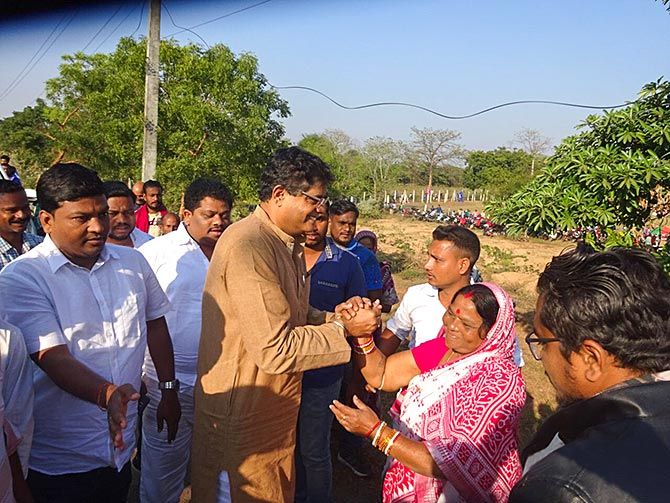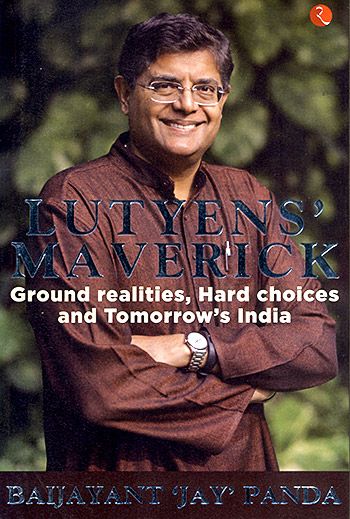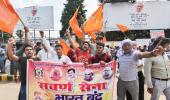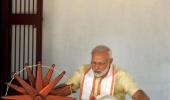'The biggest challenge and the one that needs immediate attention is massive shortcoming of jobs, leading to rampant migration from the state (almost 4 million Odias migrated!).
'This forces them to work in abysmal and inhumane working conditions.'
'Some are fortunate to come back alive, while some return in coffins.'

"Naveen Patnaik's personality is diametrically opposite to his father (Biju Patnaik). He is an introvert and speaks little. While Biju Uncle oozed magnanimity, Naveen has often been described as ruthless," says Baijayant 'Jay' Panda, who was suspended from the Biju Janata Dal and resigned from the BJD last year.
One of the BJD's founders, Jay Panda was one of the most vocal MPs in Parliament for 18 years. A compilation of his opinion pieces has just been published, in a book quite aptly called Lutyen's Maverick.
"It seems evident that this election will be a contest, which was not the conventional wisdom a year ago. However, it would be imprudent to be dismissive about the prime minister and his party," Jay Panda tells Rediff.com's Archana Masih. Part 1 of an e-mail interview.
You were among the founding members of the BJD and have seen the functioning of both Biju Patnaik and Naveen Patnaik. How different are they as chief ministers?
Biju Babu played a pivotal role in bringing Odisha to the forefront. Being family friends, I have had the privilege of interacting with Biju Uncle and his family all my life.
He gained enormous respect around the world for his work, which was compassionate and morally sound. He gave us a larger-than-life figure with enormous charisma and a huge heart. He earned the love of the people of Orissa for his passionate espousal of the state and its development.
After his departure, the Biju Janata Dal was formed on the principles espoused by Biju Uncle, and Naveen was given the responsibility of carrying forward the lineage.
Naveen's personality is diametrically opposite to his father. He is an introvert and speaks little. While Biju Uncle oozed magnanimity, Naveen has often been described as ruthless.
But he too gained enormous popularity in Odisha right from his early days in politics because of the tough actions he took against corruption and criminality.
While Biju Babu, having been an industrialist earlier, had an equal focus on both social and economic development of the state, Naveen's focus has been much more on the social aspects.
Since you left the BJD there was speculation that you would join the BJP. Why are you perceived to be close to the BJP?
Many commentators had claimed that as soon as I leave the BJD, I would join the BJP. It seems I have disappointed them as seven months later I have not joined any party.
I think one reason some commentators misunderstood or deliberately misrepresented my position was that I had championed some decisions of the BJP government, but that was on principle, since I have been championing them for 20 years when the BJP and BJD had an alliance, and not because of political positioning.
I will continue to champion those issues now as well, but I hope so-called political pundits will realise that my stands are consistent over the years.
What is your sense of India's mood as it moves into another general election?
It seems evident that this election will be a contest, which was not the conventional wisdom a year ago.
On the one hand, the Congress party seems re-energised, and on the other hand several regional parties have become very active and started cooperating.
These will surely have their impact in the elections. However, it would be imprudent to be dismissive about the prime minister and his party.
The PM is the most gifted political communicator in India for a generation and his party over the past five years has become the largest political machine today in the country which should not be underestimated.
If you had to point one reason for leaving the BJD, what would that be?
Over the past five years, the party with which I had been associated since inception in the late 1990s, veered away from the original, laudable, principles and become the same venal, violent, organisation against which we started our movement.
When I tried speaking out internally, I was suppressed, but my conscience compelled me to speak out in public and I pointed out where the BJD had deviated from earlier actions and how we should go back to it.
I did all of this without any malice, but this led to me being sidelined by the new coterie which has taken control of the party and even ordered physical attacks on me.
I took all of that, but the last straw came, when during last year the party banned any BJD member from visiting the last rites for my father, Dr Bansidhar Panda, who shared a deep bond with Biju Uncle and contributed to development in Odisha.
After you left the BJD 7 months ago, what have been some learnings from travelling around Odisha and India?
I have always been on the go with spending a majority of my time with the people back in my constituency, travelling extensively, interacting with people, political leaders, to get a sense of public mood and on ground expectations before embarking onto a new political journey.
A social media suggestion prompted me to spearhead a campaign by the name hashtag #Heijau, (the Odia equivalent of the Hindi term Ho Jaye) which is an informal interaction with people over a cup of tea.
Initially, it started with hundreds attending it and now has thousands. The one in Dhenkanal, Odisha, saw some 20,000 attendees. People are frustrated with rampant corruption, unemployment, sordid health and educational facilities as well as poor women safety conditions, and are seeking a regime change.
They are in hope of a better future for Odisha.
Apart from spending time back in my state, I have been involved with speaking discussions at major policy events around the country. The issues that I have raised in my book are also which I relentlessly pursue and vouch for.
Learning from across the country has brought me to the conclusion that unemployment is the major cause of resentment across the nation and needs immediate attention of policymakers.

As Odisha nears another assembly and national election -- what has fundamentally changed in the state in the last few years?
The past few years have been a difficult time period in my state with three very serious challenges before the upcoming elections.
The biggest challenge and the one that needs immediate attention is massive shortcoming of jobs, leading to rampant migration from the state (almost four million Odias migrated!).
This forces them to work in abysmal and inhumane working conditions.
Some are even forced into all sorts of work. I myself get multiple requests from Odias stuck around the world, waiting for repatriation back home.
Some are fortunate to come back alive, while some return in coffins.
Every time I write a letter to the concerned authorities/consulates with a heavy heart and pray no one else should face such depravity.
The second challenge is of rampant corruption which has been on the mend in Odisha for a few years and has come back roaring. Massive multi-crore scandals, chit fund scam, black rose sinking scam etc have tainted my state.
An average Odia interacting with the government is unable to pursue his basic rights without shelling out for bribes.
Ever rising and unending crime is the third major issue facing the state.
Crimes against women and children are on rise; recently we saw a Class 8 girl delivering a baby in a school in Odisha.
The Kundli and Pipli victims still await justice while crime has sky rocketed.
Shockingly, Odisha has seen a large number of gruesome crimes like gang rapes and murders of children and women in the last three years.











 © 2025
© 2025